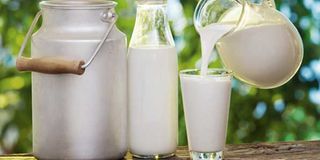Milk import fee up by over 1,000 per cent

What you need to know:
- New regulations require traders to pay Sh2,000 for every kilogramme of imported milk, up from Sh150, which translates into a 13-fold increase.
Dar es Salaam. The government has introduced new regulations under which milk import fees have increased 13-fold, with some stakeholders saying the move will hurt the dairy industry.
To import a kilogramme of milk, the processors say were paying Sh150, but under the newly signed Animal Diseases and Animal Products Movement Control Regulations they are now required to pay Sh2,000.
This is a 1,233 per cent increase.
“These are not just regulations, but a total ban. It’s not possible for fees to rise at that rate…our products will no longer penetrate the market due to high prices,” said Woodland Dairy country director Kariras Alando.
The company, which has its headquarters in South Africa, distributes First Choice milk.
“Business is already tough and these regulations are making things worse,” he added.
The regulations, which were signed by Livestock and Fisheries minister Luhaga Mpina in August, came into effect on October 1.
The permanent secretary in the Ministry of Livestock and Fisheries, Prof Elisante Ole Gabriel, confirmed the signing of the regulations.
Following enforcement of the new rules, some milk importers were reported to have convened a crisis meeting yesterday to discuss their fate.
One of the members who attended the meeting told The Citizen that they were not sure if they will go on with the business under the new operating environment. “We know our market and these rules will make our products so expensive that it will be virtually impossible to sell them. We are meeting to discuss what we can do,” the source said.
Industry players also said that the move may discourage the consumption of milk and other dairy products in Tanzania.
The Tanzania Dairy Board, which is among the beneficiaries through a one per cent charge, said it cannot go against a government decision.
“The ministry is our parent and the parent has all powers over family affairs on what should be done and at what particular time,” said the board’s acting registrar, Mr Jeremiah Temu. Tanzania has the third largest cattle population in Africa, but milk production is still low in the country.
The World Health Organisation (WHO) recommends an average of 200 litres consumption of milk but Tanzania’s consumption per capita is around 45 litres per year.
Another dairy stakeholder, Mr Samuel Makubo, said the impact of increasing the fee will affect not only milk importers but the whole industry chain.
“Local production cannot match demand and the new fees will restrict importation of milk among processors. We will have to fight for what is available locally,” he said.
Local milk plants are capable of processing 700,000 litres daily but are working at only 40 per cent of their installed capacity due to a shortage of milk, among other reasons.
Data indicates that Tanzania spends over Sh165 billion to import milk annually in a bid to fill the gap.
The country manager of Kenya’s New KCC in Tanzania, Mr Marigo Chacha, said the impact will hurt suppliers who have invested a lot and created jobs.
“Tanzania imports butter and ghee from other countries as there is no local processing. If other countries decide to restrict our products through moves like this then it can spark a trade war,” he said.
While milk importers are unhappy with the new fees, local processors see the move as an opportunity for them to flourish.
“We really congratulate the government for this decision which will not only attract investors to Tanzania but also benefit local livestock keepers. It’s my hope that there will be local powdered milk processors soon,” said the managing director of Iringa-based Asas Dairies Ltd, Mr Fuad Jaffer.




